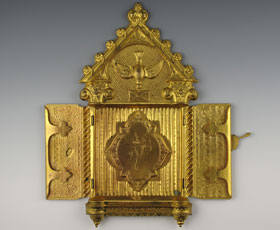Valentine

Needle Case

Design Representation
Design Details
Needle Case Type: |
Figural (not listed on design registration as a needle case, however it is listed as a needle case in an 1873 advertisement) |
Patent/Registered to: |
W. Avery & Son - Redditch |
Patent/Design Representation #: |
Ornamental Class1: Metal: #269271 |
Patent/Design Registration Date: |
December 27, 1872 |
Location of Patent/Design Registration: |
The National Archives (TNA) - Kew, UK |
Reference #: |
TNA Representation - BT 43/33/269271
TNA Register - BT 44/3/269271 |
Dimensions: |
5.5 x 0.5 x 11.4 |
Material: |
Brass |
Name Variations: |
W. Avery & Son - Redditch |
Other Variations: |
a) Flat back with interior diamond frame and engraved cupid
b) Easel back with interior diamond frame and engraved cupid
c) Easel back with interior oval frame |
Additional Photographs


Front details


Exterior arrow detail and side view of easel back version


Flat back with interior diamond frame and engraved cupid: front open and back views


Flat back with interior diamond frame: interior engraved cupid detail and front bottom with signature detail


Easel back with interior oval frame: front open and back views


Easel back with interior oval frame: front and back details


Easel back with interior diamond frame and engraved cupid: front and back details (photographs from eBay)
Facts
A valentine is a card, gift or greeting given to a loved one on Valentine’s Day. They come in many different sizes and shapes and
usually include cupids, doves, flowers and hearts. Although printed valentines are still the most common, electronic versions are gaining
popularity as society becomes more paperless. In terms of the sheer numbers of greetings sent annually, February 14 ranks second only
to Christmas.

History
Valentine greetings began to appear in the Middle Ages, however, it wasn’t until the 15th century that they appeared in written form.
The first written valentine is attributed to Charles, Duke of Orleans, composed in 1415 to his wife in France while he was imprisoned in the
Tower of London. During the 16th and 17th centuries valentines become commonplace in Europe, especially in England, however, they had to
be delivered by hand or left on doorsteps. Their popularity increase tenfold during the Victorian Era because of advances in color
printing and the introduction of the “penny post” which made it easy and inexpensive to mail them.

Miscellaneous
Cupid is often depicted on valentines as a naked winged boy who carries a bow and arrows and is considered the symbol of love. The
famous Italian Renaissance painter Raphael included the cupid shown below in one of his famous frescos painted in 1514.
























